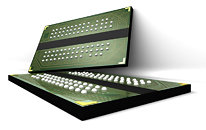malware
New Member
- Joined
- Nov 7, 2004
- Messages
- 5,422 (0.73/day)
- Location
- Bulgaria
| Processor | Intel Core 2 Quad Q6600 G0 VID: 1.2125 |
|---|---|
| Motherboard | GIGABYTE GA-P35-DS3P rev.2.0 |
| Cooling | Thermalright Ultra-120 eXtreme + Noctua NF-S12 Fan |
| Memory | 4x1 GB PQI DDR2 PC2-6400 |
| Video Card(s) | Colorful iGame Radeon HD 4890 1 GB GDDR5 |
| Storage | 2x 500 GB Seagate Barracuda 7200.11 32 MB RAID0 |
| Display(s) | BenQ G2400W 24-inch WideScreen LCD |
| Case | Cooler Master COSMOS RC-1000 (sold), Cooler Master HAF-932 (delivered) |
| Audio Device(s) | Creative X-Fi XtremeMusic + Logitech Z-5500 Digital THX |
| Power Supply | Chieftec CFT-1000G-DF 1kW |
| Software | Laptop: Lenovo 3000 N200 C2DT2310/3GB/120GB/GF7300/15.4"/Razer |
Micron Technology, today announced production sampling of its new 1Gb DDR2 device fabricated on 68-nanometer (nm) DRAM process technology. The new process, coupled with Micron's 6F² technology, has enabled the world's smallest production 1Gb DDR2 memory with a die size of just 56mm². Mass production of its new 68nm 1Gb DDR2 products is expected to begin early next year, with DDR3 and other low-power DRAM products expected to follow in the second half of the year.

"Micron continues leading the world in development of advanced memory technology," said Brian Shirley, vice president of Micron's memory group. "Our 68nm process technology offers our customers best-in-class die sizes, power and speed benefits for their most demanding applications."
This new advanced memory technology will be targeted at server, mobile and other computing applications where the benefits of reduced die size, faster speeds and lower power consumption are most critical. Upcoming DDR3 products developed on the new process will allow for speeds up to 1600 megabits per second (Mbps). The 68nm process also provides approximately 20 percent lower power consumption when compared to previous process generations. Future DDR3 chips designed on the 68nm process will join Micron's Aspen Memory family of energy-efficient products, which are specifically designed for applications where power reduction is desired such as data center servers and notebook computers.
View at TechPowerUp Main Site

"Micron continues leading the world in development of advanced memory technology," said Brian Shirley, vice president of Micron's memory group. "Our 68nm process technology offers our customers best-in-class die sizes, power and speed benefits for their most demanding applications."
This new advanced memory technology will be targeted at server, mobile and other computing applications where the benefits of reduced die size, faster speeds and lower power consumption are most critical. Upcoming DDR3 products developed on the new process will allow for speeds up to 1600 megabits per second (Mbps). The 68nm process also provides approximately 20 percent lower power consumption when compared to previous process generations. Future DDR3 chips designed on the 68nm process will join Micron's Aspen Memory family of energy-efficient products, which are specifically designed for applications where power reduction is desired such as data center servers and notebook computers.
View at TechPowerUp Main Site



